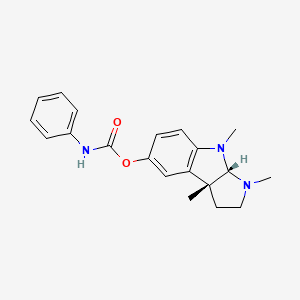
Synopsis
Synopsis
0
API Suppliers
0
USDMF
0
CEP/COS
0
JDMF
0
EU WC
0
KDMF
0
NDC API
0
VMF
0
Listed Suppliers
0
EDQM
0
USP
0
JP
0
Others
0
FDF Dossiers
0
FDA Orange Book

0
Europe

0
Canada

0
Australia

0
South Africa

0
Listed Dossiers
DRUG PRODUCT COMPOSITIONS
0
US Patents
0
US Exclusivities
0
Health Canada Patents
US Medicaid
NA
Annual Reports
NA
Regulatory FDF Prices
NA
0
API
0
FDF
0
Data Compilation #PharmaFlow
0
Stock Recap #PipelineProspector
0
Weekly News Recap #Phispers


1. N-phenylcarbamoyl Eseroline
2. N-phenylcarbamoyleseroline
3. Phenserine
1. (+)-phenserine
2. R-phenserine
3. 116839-68-0
4. (+)-posiphen
5. Phenserine, (+)-
6. Buntanetap
7. Anvs401
8. Buntanetap [usan]
9. (+)-phenylcarbamoyleseroline
10. Anvs-401
11. Z0o4tj588o
12. (+)-o-(phenylcarbamoyl)eseroline
13. (3ar,8as)-1,3a,8-trimethyl-1,2,3,3a,8,8a-hexahydropyrrolo[2,3-b]indol-5-yl Phenylcarbamate
14. Pyrrolo(2,3-b)indol-5-ol, 1,2,3,3a,8,8a-hexahydro-1,3a,8-trimethyl-, 5-(n-phenylcarbamate), (3ar,8as)-
15. Unii-z0o4tj588o
16. Chembl4297417
17. Dtxsid001110145
18. Who 12342
19. Db15317
20. Hy-16009
21. Cs-0006062
22. [(3as,8br)-3,4,8b-trimethyl-2,3a-dihydro-1h-pyrrolo[2,3-b]indol-7-yl] N-phenylcarbamate
| Molecular Weight | 337.4 g/mol |
|---|---|
| Molecular Formula | C20H23N3O2 |
| XLogP3 | 2.3 |
| Hydrogen Bond Donor Count | 1 |
| Hydrogen Bond Acceptor Count | 4 |
| Rotatable Bond Count | 3 |
| Exact Mass | 337.17902698 g/mol |
| Monoisotopic Mass | 337.17902698 g/mol |
| Topological Polar Surface Area | 44.8 Ų |
| Heavy Atom Count | 25 |
| Formal Charge | 0 |
| Complexity | 507 |
| Isotope Atom Count | 0 |
| Defined Atom Stereocenter Count | 2 |
| Undefined Atom Stereocenter Count | 0 |
| Defined Bond Stereocenter Count | 0 |
| Undefined Bond Stereocenter Count | 0 |
| Covalently Bonded Unit Count | 1 |
Cholinesterase Inhibitors
Drugs that inhibit cholinesterases. The neurotransmitter ACETYLCHOLINE is rapidly hydrolyzed, and thereby inactivated, by cholinesterases. When cholinesterases are inhibited, the action of endogenously released acetylcholine at cholinergic synapses is potentiated. Cholinesterase inhibitors are widely used clinically for their potentiation of cholinergic inputs to the gastrointestinal tract and urinary bladder, the eye, and skeletal muscles; they are also used for their effects on the heart and the central nervous system. (See all compounds classified as Cholinesterase Inhibitors.)
ABOUT THIS PAGE
33
PharmaCompass offers a list of Buntanetap API manufacturers, exporters & distributors, which can be sorted by GMP, USDMF, JDMF, KDMF, CEP (COS), WC, Price,and more, enabling you to easily find the right Buntanetap manufacturer or Buntanetap supplier for your needs.
Send us enquiries for free, and we will assist you in establishing a direct connection with your preferred Buntanetap manufacturer or Buntanetap supplier.
PharmaCompass also assists you with knowing the Buntanetap API Price utilized in the formulation of products. Buntanetap API Price is not always fixed or binding as the Buntanetap Price is obtained through a variety of data sources. The Buntanetap Price can also vary due to multiple factors, including market conditions, regulatory modifications, or negotiated pricing deals.
A Buntanetap manufacturer is defined as any person or entity involved in the manufacture, preparation, processing, compounding or propagation of Buntanetap, including repackagers and relabelers. The FDA regulates Buntanetap manufacturers to ensure that their products comply with relevant laws and regulations and are safe and effective to use. Buntanetap API Manufacturers are required to adhere to Good Manufacturing Practices (GMP) to ensure that their products are consistently manufactured to meet established quality criteria.
A Buntanetap supplier is an individual or a company that provides Buntanetap active pharmaceutical ingredient (API) or Buntanetap finished formulations upon request. The Buntanetap suppliers may include Buntanetap API manufacturers, exporters, distributors and traders.
Buntanetap Active pharmaceutical ingredient (API) is produced in GMP-certified manufacturing facility.
GMP stands for Good Manufacturing Practices, which is a system used in the pharmaceutical industry to make sure that goods are regularly produced and monitored in accordance with quality standards. The FDA’s current Good Manufacturing Practices requirements are referred to as cGMP or current GMP which indicates that the company follows the most recent GMP specifications. The World Health Organization (WHO) has its own set of GMP guidelines, called the WHO GMP. Different countries can also set their own guidelines for GMP like China (Chinese GMP) or the EU (EU GMP).
PharmaCompass offers a list of Buntanetap GMP manufacturers, exporters & distributors, which can be sorted by USDMF, JDMF, KDMF, CEP (COS), WC, API price, and more, enabling you to easily find the right Buntanetap GMP manufacturer or Buntanetap GMP API supplier for your needs.
A Buntanetap CoA (Certificate of Analysis) is a formal document that attests to Buntanetap's compliance with Buntanetap specifications and serves as a tool for batch-level quality control.
Buntanetap CoA mostly includes findings from lab analyses of a specific batch. For each Buntanetap CoA document that a company creates, the USFDA specifies specific requirements, such as supplier information, material identification, transportation data, evidence of conformity and signature data.
Buntanetap may be tested according to a variety of international standards, such as European Pharmacopoeia (Buntanetap EP), Buntanetap JP (Japanese Pharmacopeia) and the US Pharmacopoeia (Buntanetap USP).
